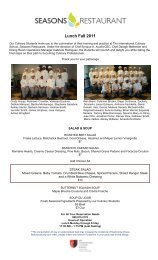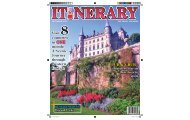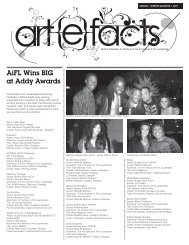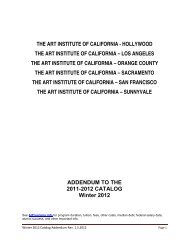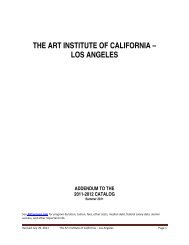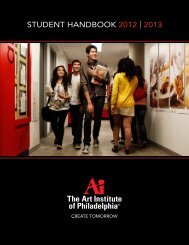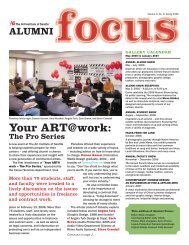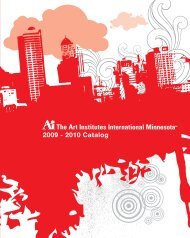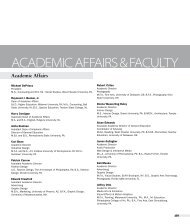CATALOG 2011-2012 - The Art Institutes
CATALOG 2011-2012 - The Art Institutes
CATALOG 2011-2012 - The Art Institutes
Create successful ePaper yourself
Turn your PDF publications into a flip-book with our unique Google optimized e-Paper software.
CULINARY ARTS COURSES<br />
CU1210 - Concepts and <strong>The</strong>ories<br />
of Culinary Techniques<br />
2 credits; **This course requires a “C” or<br />
higher to pass in all CUL and BP.<br />
Prerequisite: none<br />
<strong>The</strong> fundamental concepts, skills, and techniques<br />
involved in basic cookery are covered in this<br />
course. Special emphasis is given to the study<br />
of ingredients and cooking theories. Lectures<br />
teach organization skills in the kitchen and<br />
work coordination. <strong>The</strong> basics of stocks, soups,<br />
sauces, vegetable cookery, starch cookery, meat,<br />
and poultry are covered. Emphasis is given to<br />
basic cooking techniques such as sautéing,<br />
roasting, poaching, braising and frying.<br />
CU1443 - <strong>Art</strong>isan Breads and<br />
Baking Production<br />
4 credits<br />
Prerequisite: CU1642 - Introduction to<br />
Baking and Pastry Techniques<br />
This course provides the information, tools and<br />
instruction to gain proficiency in the preparation<br />
of a variety of artisan breads. Emphasis will be<br />
placed upon learning to mix, ferment, shape,<br />
bake and store hand crafted breads. Students will<br />
focus on traditional fermentation, as well as the<br />
science of the ingredients. Students learn assembly<br />
speed and increase their proficiency in meeting<br />
production deadlines with quality products.<br />
CU1444 - European Cakes and Tortes<br />
4 credits<br />
Prerequisite: CU1642 - Introduction to<br />
Baking and Pastry Techniques<br />
Students will build on competencies previously<br />
learned and apply those skills into new products<br />
to create more elaborate tortes and cakes<br />
using complex finishing methods by applying<br />
glazes, using decorative sponges, and building<br />
multi-component cakes. Topics to be covered<br />
include comparison of classical and modern<br />
preparations, classical cakes; glazed, iced,<br />
molded, and cream filled cakes, and bombes.<br />
CU1445 - Chocolate, Confections<br />
and Centerpieces<br />
4 credits<br />
Prerequisite: CU1642 - Introduction to<br />
Baking and Pastry Techniques<br />
Students are introduced to the fundamental<br />
concepts, skills and techniques of chocolates<br />
and confections. Students are introduced to<br />
the basic techniques used in forming simple<br />
centerpieces. Lectures and demonstrations teach<br />
chocolate tempering, candy production and the<br />
rules that apply when creating centerpieces<br />
CU1446 - Advanced Patisserie<br />
and Display Cakes<br />
4 credits<br />
Prerequisite: CU1642 - Introduction to<br />
Baking and Pastry Techniques<br />
This course explores the techniques of plated<br />
desserts and the theory behind building<br />
edible art for A la Carte service, competition or<br />
banquet functions. Methods and procedures<br />
for producing high quality specialty decorated<br />
cakes, as well as the design, assembly, and<br />
decorating of wedding cakes will be introduced.<br />
CU1610 - Fundamentals of<br />
Classical Techniques<br />
6 credits; **This course requires a “C” or<br />
higher to pass in all CUL and BP.<br />
Prerequisite: none<br />
<strong>The</strong> fundamental concepts, skills, and techniques<br />
involved in basic cookery are covered in<br />
this course. Special emphasis is given to the<br />
study of ingredients, cooking theories, and<br />
the preparation of stocks, broths, glazes, and<br />
soups, thickening agents, the grand sauces, and<br />
emulsion sauces. Lectures and demonstrations<br />
teach organization skills in the kitchen, work<br />
coordination, and knife skills. <strong>The</strong> basics of<br />
vegetable cookery, starch cookery, meat, and<br />
poultry are covered. Emphasis is given to basic<br />
cooking techniques such as sauteing, roasting,<br />
poaching, braising and frying. Students must<br />
successfully pass a practical cooking examination<br />
covering a variety of cooking techniques.<br />
CU1620 - American Regional Cuisine<br />
6 credits<br />
Prerequisite: CU1210 - Concepts & <strong>The</strong>ories<br />
of Culinary Techniques and CU1610 -<br />
Fundamentals of Classical Techniques<br />
<strong>The</strong> course reinforces the knowledge and skill<br />
learned in the preceding classes and helps students<br />
build confidence in the techniques of basic cookery.<br />
<strong>The</strong> development of knife skills is accented.<br />
American Regional Cuisine explores the use of<br />
indigenous ingredients in the preparation of traditional<br />
and contemporary American specialties. <strong>The</strong><br />
concepts of mise en place, time-lines, plate presentation,<br />
and teamwork in a production setting are<br />
introduced and accentuated. Timing and organization<br />
skills are emphasized.<br />
CU1642 - Introduction to Baking<br />
and Pastry Techniques<br />
6 credits; **This course requires a “C” or<br />
higher to pass for all BP students.<br />
Prerequisite: none<br />
This course is a combination of theory, lecture,<br />
demonstration, and hands-on production to<br />
provide an introduction to baking and pastry<br />
techniques for use in a commercial kitchen.<br />
Special focus is placed on the study of ingredient<br />
functions, product identification, and weights<br />
and measures as applied to baking and pastry<br />
techniques. Instruction is provided on the<br />
preparation of yeast-raised dough mixing methods,<br />
roll-in doughs, pie doughs, basic cake mixing<br />
methods, fillings, icings, pastry cream, and finishing<br />
techniques. Students must pass a practical exam.<br />
CU2240 - Asian Cuisine<br />
2 credits<br />
Prerequisite: CU1620 - American Regional Cuisine<br />
This course emphasizes both the influences<br />
and ingredients that create the unique<br />
character of selected Asian cuisines. Students<br />
prepare, taste, serve, and evaluate traditional,<br />
regional dishes of the cuisines of India,<br />
the four regions of China, Japan, Vietnam,<br />
Thailand, and Indonesia. Importance will<br />
be placed on ingredients, flavor<br />
profiles, preparations, and techniques<br />
representative of these cuisines.<br />
CU2252 - Latin Cuisine<br />
2 credits<br />
Prerequisite: CU1620 - American Regional Cuisine<br />
This course emphasizes both the influences and<br />
ingredients that create the unique character<br />
of selected Latin cuisines. Students prepare,<br />
taste, serve, and evaluate traditional, regional<br />
dishes of Mexico, South America and the<br />
Caribbean Islands. Importance will be placed<br />
on ingredients, flavor profiles, preparations, and<br />
techniques representative of these cuisines.<br />
CU2272 - World Cuisine<br />
2 credits<br />
Prerequisite: CU1620 - American Regional Cuisine<br />
This course emphasizes both the influences and<br />
ingredients that create the unique character<br />
of selected World cuisines. Students prepare,<br />
taste, serve, and evaluate traditional, regional<br />
dishes of Spain, Middle East, Turkey, Greece,<br />
Africa and India. Importance will be placed on<br />
ingredients, flavor profiles, preparations, and<br />
techniques representative of these cuisines.<br />
CU2273 - Classical European Cuisine<br />
2 credits<br />
Prerequisite: CU1620 - American Regional Cuisine<br />
This course emphasizes both the influences and<br />
ingredients that create the unique character of<br />
selected Classical European Cuisines. Students<br />
prepare, taste, serve, and evaluate traditional,<br />
regional dishes of British Isles, Italy, France, and<br />
Germany, Austria, Switzerland, and Scandinavian<br />
countries. Importance will be placed on<br />
ingredients, flavor profiles, preparations, and<br />
techniques representative of these cuisines.<br />
CU2408 - Management, Supervision<br />
& Career Development<br />
4 credits<br />
Prerequisite: none<br />
This is a multifaceted course that focuses on<br />
managing people from the hospitality supervisor’s<br />
viewpoint, and developing job search skills. <strong>The</strong><br />
management emphasis is on techniques for<br />
increasing productivity, controlling labor costs,<br />
time management, and managing change. It also<br />
stresses effective communication and explains<br />
the responsibilities of a supervisor in the food<br />
service industry. Students develop techniques<br />
and strategies for marketing themselves in their<br />
chosen fields. Emphasis will be placed on students<br />
assessing their marketable skills, developing<br />
a network of contacts, generating interviews,<br />
writing a cover letter and resume, preparing<br />
for their employment interview, presenting a<br />
professional appearance, and interview follow-up.<br />
CU2409 - Management By Menu<br />
4 credits<br />
Prerequisite: none<br />
This course prepares future food service managers<br />
by giving a clear picture of the important role menu<br />
planning plays within operations. It covers topics<br />
ranging from menu development, pricing, and<br />
evaluation to facilities design and layout. Students<br />
will benefit because good menu development is<br />
crucial to the success of any foodservice operation.<br />
For example: a planning tool, source of operational<br />
information and as a merchandising method for<br />
reaching patrons. (Prerequisite: none) 4 Credits<br />
CU2410 - Sustainable Purchasing<br />
& Controlling Costs<br />
4 credits<br />
Prerequisite: none<br />
This course introduces the student to the<br />
methodologies and tools used to control costs and<br />
purchase supplies. This course helps the student<br />
value the purchasing, planning, and control<br />
processes in the food and beverage industry.<br />
Primary focus is on supplier selection, planning,<br />
and controlling costs, with an introduction to the<br />
study of sustainable products and approaches.<br />
Topics include planning and controlling costs<br />
using budgeting techniques, standard costing,<br />
standardized recipes, performance measurements,<br />
59



